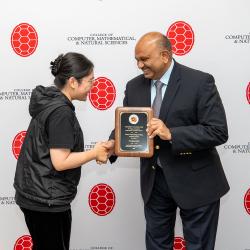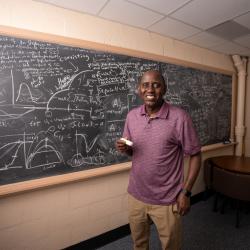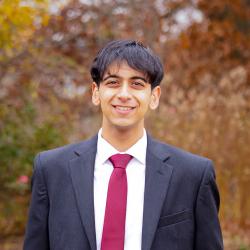Two Science Terps Named 2022 Churchill Scholars
Seniors Steven Jin and Naveen Raman from the University of Maryland’s College of Computer, Mathematical, and Natural Sciences (CMNS) have been awarded 2022 Winston Churchill Scholarships, which offers them full funding to pursue a one-year master’s degree at the University of Cambridge in the United Kingdom. The scholarship, valued at around $60,000, covers all educational fees and provides living and travel allowances.
“Steven and Naveen have both demonstrated a sustained commitment to research, leadership and service,” said CMNS Dean Amitabh Varshney. “I join their mentors and the entire Terp community in congratulating them on being named Churchill Scholars. We couldn't be more proud of them!”
Nationally, 16 students in the sciences, engineering or mathematics received Churchill Scholarships this year out of 110 nominations from 73 participating institutions. Seven UMD students have been nominated in the past five years—and all of them have been named Churchill Scholars.
“Lighting doesn’t usually strike twice in a competition as fierce as the Churchill, but Steven and Naveen are forces of nature and this extraordinary twin success is testament to their hard work, talent and ambition,” said Richard Bell, a UMD professor of history who serves as the university’s faculty advisor for United Kingdom fellowships.
Steven Jin
Jin, a mathematics major, is interested in arithmetic algebraic geometry (where number theory and geometry come together) and geometric representation theory (which seeks to study symmetry by using techniques from geometry). He has published two papers, had a third paper recently accepted, and given 11 oral presentations at research conferences and 25 expository talks.
 The Churchill Scholarship will allow Jin to pursue his Master of Advanced Study degree (also known as Part III of the Mathematical Tripos) at the University of Cambridge. After his time there, Jin plans to pursue a Ph.D. in mathematics.
The Churchill Scholarship will allow Jin to pursue his Master of Advanced Study degree (also known as Part III of the Mathematical Tripos) at the University of Cambridge. After his time there, Jin plans to pursue a Ph.D. in mathematics.
“I am interested in a modern research program called the Langlands Program, which describes a broad web of research threads that aim to unite certain concepts across fields like number theory, algebraic geometry and even Fourier analysis,” Jin said. “I have been introduced to many of these research threads via graduate courses, reading courses and working seminars, and I am learning to navigate the associated literature through my honors thesis work.”
At UMD, he has worked with Mathematics Professor Lawrence Washington on elliptic curve analogues of classical lower bounds on the least primitive root of a prime. This work resolves a variation of a well-studied question about the integers, recast to the modern context of arithmetic algebraic geometry. With his departmental honors thesis advisor, Mathematics Professor Thomas Haines, Jin is working to develop a theory of Rapoport-Zink local models for split reductive groups over arbitrary function fields. If successful, this work will grant researchers in the field certain representation-theoretic machinery that was previously restricted only to special cases.
“Steven Jin is an extremely energetic, passionate and devoted student of mathematics,” Haines said. “He is unusually broadly informed for an undergraduate student and is currently functioning like a mid-career graduate student.”
Jin has also participated in research experiences for undergraduates (REU) programs for the last three summers. At the University of Tennessee at Chattanooga in 2019, he used techniques from analytic number theory and harmonic analysis to produce new bounds for numerous classes of exponential sums. In 2020, at Kent State University, Jin used techniques from noncommutative ring theory and combinatorics to unify and generalize pre-existing results on the Behrens radical properties of noncommutative rings. He spent this past summer at the University of Virginia using techniques from analytic and algebraic number theory to exhibit the first completely explicit and unconditional effective bounds in the error term for the Sato-Tate conjecture.
Jin has received the UMD Department of Mathematics’ Strauss Scholarship, Dan Shanks Award in computational number theory, Higginbotham Award and several travel grants to speak at research conferences. He was also awarded a Maryland Summer Scholars grant.
Outside the classroom, he speaks to students in high school math clubs in Howard County, Maryland, where he grew up and attended Mount Hebron High School. He has also tutored dozens of middle and high school students as they prepared for the SAT, ACT and AP exams, and he trained students for the American Math Competition. He also helped inmates in Howard County prepare for the mathematics GED test.
As a residence hall president, assistant vice president of academic affairs for the SGA, and SGA representative to the Teaching and Learning Transformation Center advisory committee, Jin spearheaded a number of projects, such as expanding study spaces across campus, promoting textbook affordability and increasing internship-related travel support.
Naveen Raman
Raman, a computer science and mathematics double major, began working with UMD computer science faculty members in 2018. Since then, he has authored or co-authored seven conference papers on topics at the intersection of computer science, economics and social good.
 The Churchill Scholarship will allow Raman to work with Jon Crowcroft, the Marconi Professor of Communications Systems in the University of Cambridge Computer Lab, on his M.Phil. in computer science. He plans to focus on the fairness of artificial intelligence (AI) and machine learning (ML) algorithms in critical fields such as criminal justice, job markets and health care. After his time in Cambridge, Raman plans to pursue a Ph.D. in computer science.
The Churchill Scholarship will allow Raman to work with Jon Crowcroft, the Marconi Professor of Communications Systems in the University of Cambridge Computer Lab, on his M.Phil. in computer science. He plans to focus on the fairness of artificial intelligence (AI) and machine learning (ML) algorithms in critical fields such as criminal justice, job markets and health care. After his time in Cambridge, Raman plans to pursue a Ph.D. in computer science.
“For graduate school, I plan to study how AI and ML systems can work for social good through applications to health care and social networks,” Raman said. “AI and ML have the potential to revolutionize health care through improvements in clinical prognosis, but predicting patient outcomes and diseases is especially challenging for patients from marginalized communities due to data sparsity and bias. I plan to combat these problems by developing robust learning algorithms that work in the presence of data perturbations and minimize error rates.”
Raman began using intelligent computing to improve the utility and fairness of human systems with Distinguished University Professor of Computer Science Aravind Srinivasan and former Computer Science Assistant Professor Max Leiserson. He worked with them to develop algorithms to identify cancer mutation signatures before moving on to working with Computer Science Assistant Professor John Dickerson to develop policies that balance fairness and profit in ride-pooling systems.
He also works with Computer Science Associate Professor Jordan Boyd-Graber to improve question answering systems by leveraging data from trivia competitions. Raman’s focus is on advancing so-called named entity linking algorithms, which connect names found in a question to larger repositories of data about them like Wikipedia. These advances will ultimately help question answering systems perform better on a diverse set of questions.
In summer 2019, Raman worked to detect rudeness, toxicity and burnout in open-source communities as a participant in Carnegie Mellon University’s Research Experience for Undergraduates in Software Engineering program. Two summers ago, he worked at Facebook to develop a user interface for debugging machine learning models and learned about important societal issues that machine learning can help solve, such as hate speech detection. Last summer, he worked at MIT Lincoln Labs to improve human-artificial intelligence collaboration. This semester, he is working at the World Resources Institute as part of the Electric School Bus Initiative.
“Naveen is working at the forefront of a broad portfolio of fields—software engineering with his CMU colleagues, natural language processing with Jordan Boyd-Graber here at UMD, computer vision with his MIT Lincoln Labs colleagues, and 'EconCS' meets fairness in AI with me,” Dickerson said. “He is at the beginning of what will, without a doubt, be a storied and impactful career.”
Raman, who attended Richard Montgomery High School in Rockville, Maryland, is a member of the Advanced Cybersecurity Experience for Students in the Honors College and the Global Fellows program. He is also a Goldwater Scholar, President’s Scholar, Philip Merrill Presidential Scholar and a Computing Research Association Outstanding Undergraduate Researcher finalist. He has been awarded the Brendan Iribe Endowed Scholarship, Capital One Bank Dean’s Scholarship in Computer Science and Corporate Partners in Computing Scholarship.
An active competitor, Raman’s team won the National Academy Quiz Tournaments’ Division 2 Intercollegiate Championship Tournament during his freshman year. In 2020, he and two classmates received an honorable mention award in the 72-hour Mathematical Contest in Modeling for their project that analyzed the effect that rising global temperatures have on herring and mackerel fishing along the Scottish coast. He also received an outstanding award in the 2020 SIMIODE Challenge Using Differential Equations Modeling for his team’s work on modeling interactions in refugee camps.
He has been a teaching assistant for a programming languages class and the lead student instructor for a class on algorithms for coding interviews.
Off campus, Raman teaches math skills to underprivileged elementary school students in the Maryland Mentor Program and previously volunteered at the College Park Academy charter school helping students improve their math skills.







